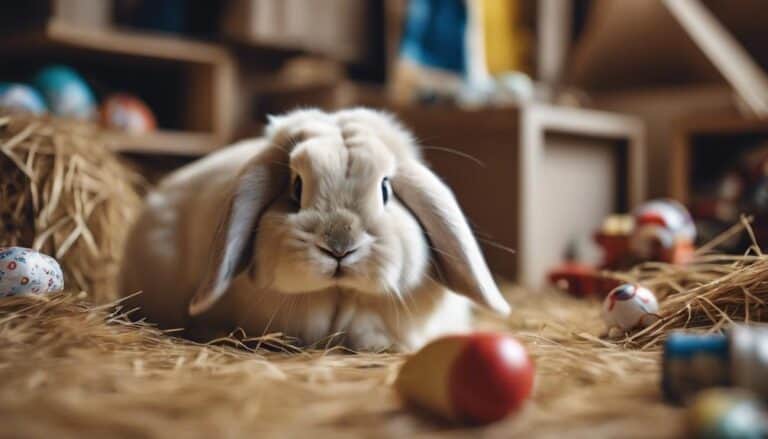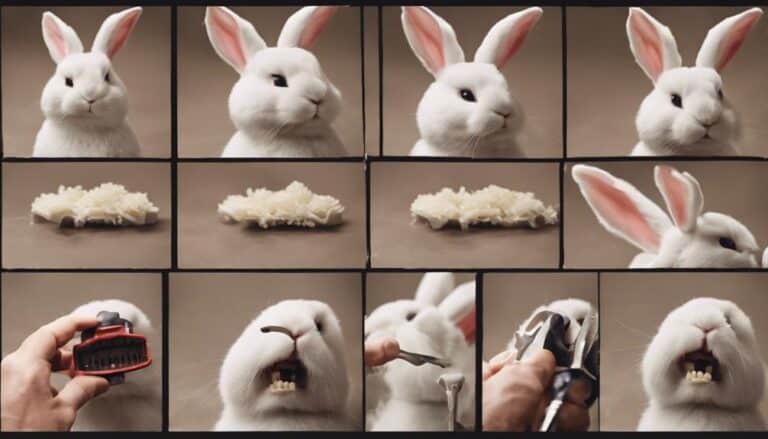You might have chuckled at the idea of bunnies experiencing colic, but the truth is, it's a serious concern for these delicate animals. Gastrointestinal stasis, also known as bunny colic, can pose significant risks to your furry friend's health.
If you've ever wondered about the intricacies of this condition and how to prevent it from affecting your bunny, you're about to uncover essential information that could make a difference in your pet's well-being. Stay tuned to discover the vital details surrounding bunny colic and how to navigate this potentially life-threatening issue with care and knowledge.
Contents
- 1 Key Takeaways
- 2 Understanding Bunny Colic
- 3 Signs of Bunny Colic
- 4 Common Causes of Bunny Colic
- 5 Diagnosing Bunny Colic
- 6 Bunny Colic Treatment Options
- 7 Preventing Bunny Colic
- 8 Bunny Colic Vs. Other Conditions
- 9 Bunny Colic Emergency Care
- 10 Supporting a Bunny Recovering From Colic
- 11 Frequently Asked Questions
- 12 Can Colic in Bunnies Lead to Explosive Symptoms?
- 13 Conclusion
Key Takeaways
- Bunny colic, or gastrointestinal stasis, can affect rabbits due to triggers like stress, pain, or improper diet.
- Symptoms include decreased appetite, lethargy, abnormal postures, and teeth grinding in rabbits.
- Prevent bunny colic by providing a high-fiber diet, managing stress, and ensuring routine vet check-ups.
- Timely veterinary intervention for diagnosis and treatment is crucial to prevent life-threatening complications in bunnies.
Understanding Bunny Colic
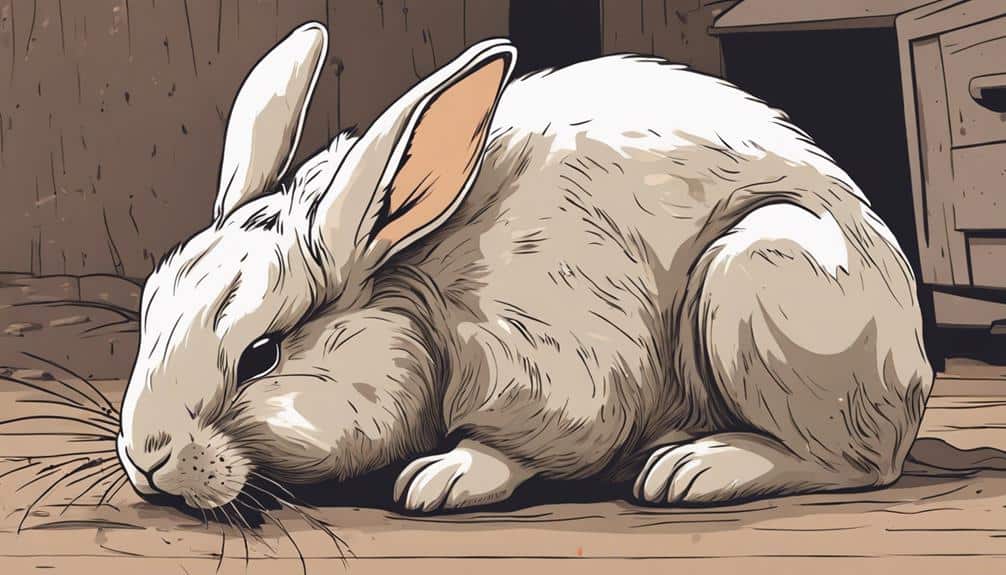
Bunny colic, also referred to as gastrointestinal stasis, is a condition that can greatly impact a rabbit's digestive system, causing it to slow down or cease functioning properly. This condition can be triggered by various factors such as stress, pain, improper diet, dental issues, and underlying health problems.
Symptoms of bunny colic may manifest as decreased appetite, reduced or absent stool output, lethargy, hunched posture, teeth grinding, and abnormal gut sounds. To diagnose bunny colic, prompt veterinary intervention is essential. Veterinarians may recommend treatments such as fluid therapy, pain management, syringe feeding, motility drugs, and assistive feeding to help the rabbit recover.
Prevention of bunny colic involves providing a high-fiber diet, ensuring regular exercise, managing stress, and scheduling routine veterinary check-ups. By taking proactive measures, such as maintaining a healthy lifestyle and seeking timely veterinary care, you can help reduce the risk of bunny colic in your beloved rabbit.
Signs of Bunny Colic
Understanding the signs of gastrointestinal stasis in rabbits is important for prompt identification and intervention to prevent potential complications. When dealing with bunny colic, keep a close eye on your rabbit for any changes in behavior.
Signs of gastrointestinal stasis in rabbits include decreased appetite, lethargy, and abnormal body postures. If you notice your rabbit eating less than usual, appearing more tired than usual, or sitting in unusual positions, these could be indicators of a problem. Additionally, behaviors like teeth grinding and changes in body temperature, such as hot or cold ears, can also signal gastrointestinal issues.
Any abnormal gut sounds should also raise concern. Remember, bunny colic can progress rapidly and become life-threatening if not addressed promptly. Seeking immediate veterinary attention is important if you suspect your rabbit is experiencing gastrointestinal stasis to ensure proper diagnosis and treatment.
Common Causes of Bunny Colic
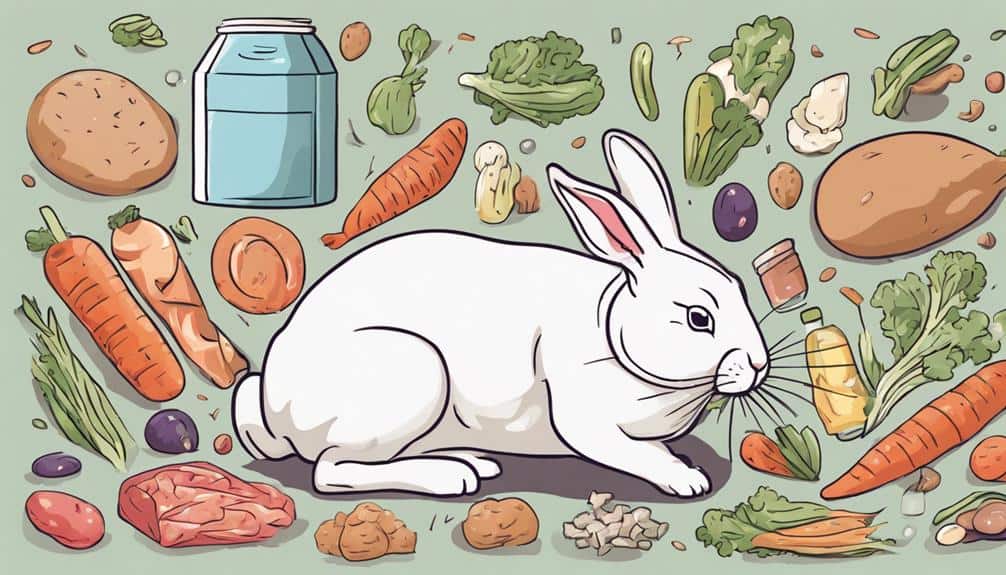
You should be aware that common causes of bunny colic include dietary issues and stress factors.
An inadequate fiber intake can lead to gastrointestinal stasis, as well as high-stress levels.
Understanding these triggers can help you take proactive steps to prevent bunny colic and guarantee your rabbit's well-being.
Diet and Colic
Introducing new foods too quickly can trigger colic in rabbits, a condition often influenced by dietary changes. When it comes to your bunny's diet, it's important to maintain a balance to prevent gastrointestinal issues that could lead to discomfort. High-starch or high-sugar treats may cause problems such as gas or abdominal pain, impacting your rabbit's well-being. Make sure your bunny has access to high fiber foods like hay and greens to support gut motility and prevent intestinal obstruction. Check the table below for a quick reference on dietary do's and don'ts for your furry friend:
| Do | Don't |
|---|---|
| High fiber foods | High-starch treats |
| Fresh water | Limited hay intake |
| Balanced diet | Excessive sugars |
| Hay and greens | High-carb foods |
Stress and Colic
Stress can frequently trigger colic in bunnies, causing disruptions in their gastrointestinal function and motility. When your bunny experiences stress, it can lead to colic, resulting in symptoms like decreased appetite, lethargy, and discomfort.
To help you understand how stress affects your bunny's health, here are some key points to take into account:
- Changes in environment, diet, or routine can induce stress-induced colic in rabbits.
- Colic in bunnies can manifest as gastrointestinal disturbances and motility issues.
- Proper stress management, routine maintenance, and a stable environment can prevent colic.
- Prompt veterinary intervention is important if your bunny shows signs of colic to avoid serious complications.
Diagnosing Bunny Colic
Diagnosing bunny colic involves closely monitoring symptoms such as decreased appetite, reduced fecal output, lethargy, unusual body postures, and abdominal pain. If you notice these signs in your rabbit, it's essential to seek a veterinary examination promptly.
A veterinarian will conduct a thorough physical assessment, potentially including X-rays, blood tests, and checks for dehydration, to accurately diagnose GI stasis. Understanding the underlying causes, which could be related to diet, stress, pain, dental issues, or infections, is vital for effective treatment.
Prompt diagnosis is key to preventing complications and ensuring your rabbit's well-being. By addressing the symptoms early and determining the root cause, you can work towards a suitable treatment plan. Remember, the sooner you act upon observing these symptoms, the better the chances of successful treatment for your bunny's colic.
Bunny Colic Treatment Options
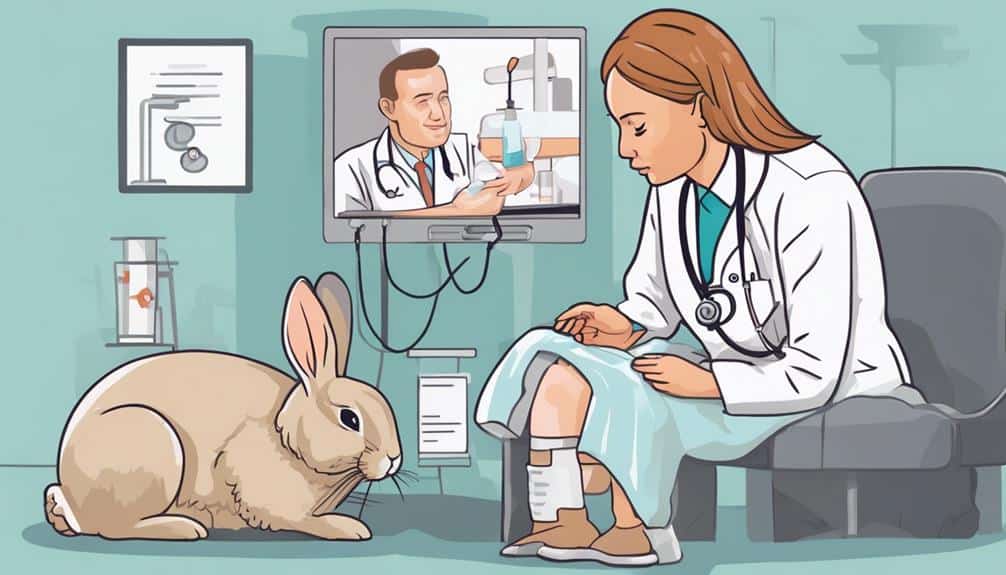
When addressing bunny colic treatment options, you can consider:
- Medication to alleviate symptoms
- Making necessary dietary changes to promote gut health
- Exploring home remedies under veterinary guidance
Implementing these measures in a timely manner can aid in resolving colic issues and improving your bunny's overall well-being.
Remember that seeking professional veterinary advice is vital to make sure the appropriate treatment plan is followed for your bunny's specific needs.
Medication for Bunny Colic
Medication options for treating bunny colic encompass a range of pharmaceutical interventions tailored to address specific symptoms and underlying causes of gastrointestinal distress in rabbits. When dealing with bunny colic, it's important to consult a rabbit-savvy veterinarian for proper diagnosis and treatment.
Some medications that may be considered include:
- Simethicone: A safe anti-gas medication commonly used to alleviate bloating in rabbits.
- Meloxicam or Buprenorphine: Pain relief medications prescribed to ease discomfort in rabbits experiencing colic.
- Metoclopramide: A prokinetic drug that can stimulate gut motility and aid in treating bunny colic.
- Enrofloxacin: Antibiotics that might be necessary if an underlying infection is contributing to the colic symptoms in rabbits.
Dietary Changes for Bunnies
To address bunny colic effectively, consider implementing dietary changes that can help alleviate symptoms and promote gastrointestinal health in rabbits. When dealing with a bunny experiencing abdominal pain, reduced appetite, bloating, or signs of distress, dietary adjustments play an important role.
Avoid sudden dietary changes, as these can trigger gastrointestinal issues leading to bunny colic. Opt for high-quality hay, fresh vegetables, and limited pellets to maintain a balanced diet. Introduce new foods gradually to prevent digestive upset and monitor your bunny's reaction closely. If stress is a factor, create a calm environment and make sure your bunny has plenty of water available.
Veterinary care should be sought if symptoms persist to provide appropriate treatment and guidance tailored to your bunny's needs.
Home Remedies for Colic
Looking to alleviate bunny colic at home using effective treatment options? Here are some home remedies that can help relieve gastrointestinal stasis in rabbits:
- Provide Unlimited Fresh Hay: Ensuring your bunny has access to fresh hay can help stimulate their gastrointestinal system and encourage eating.
- Encourage Hydration: Keeping your bunny well-hydrated is essential for preventing intestinal issues. Offer fresh water and consider adding some water-rich veggies to their diet.
- Offer Critical Care Recovery Food: In cases of severe colic, providing critical care recovery food can help restore essential nutrients and support digestive function.
- Monitor Closely and Consult a Veterinarian: Keep a close eye on your bunny's symptoms and behavior. If home remedies don't show improvement, seek immediate veterinary care to address any underlying issues.
Preventing Bunny Colic
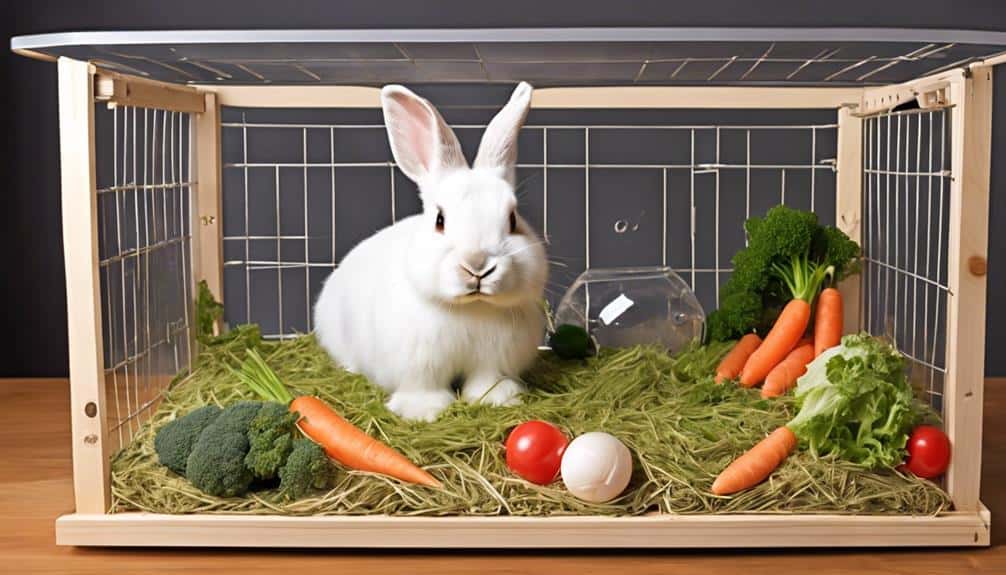
To prevent bunny colic, prioritize a high-fiber diet rich in hay and limit starchy and sugary foods. Rabbits have a delicate gastrointestinal tract that requires the constant movement of fibrous material to function properly. A diet high in fiber helps maintain this movement, preventing GI stasis, a common cause of bunny colic.
Additionally, make certain your rabbit has access to fresh water at all times to aid digestion. Regular exercise and proper grooming are also essential in preventing colic. Exercise helps keep the digestive system active, while grooming prevents fur ingestion, which can lead to blockages.
Watch for signs of decreased appetite, reduced fecal output, or unusual behavior, as these could indicate a problem. If you notice any concerning symptoms, seek immediate veterinary attention to prevent serious health complications. By following these preventive measures, you can help keep your bunny healthy and happy.
Bunny Colic Vs. Other Conditions
When distinguishing between bunny colic and other conditions, it's important to recognize the unique symptoms and underlying causes that differentiate them. Here are some key differences to help you identify bunny colic:
- Symptoms: Bunny colic symptoms may include teeth grinding, hunched posture, restlessness, and decreased or absent fecal output.
- Similarity to GI Issues: Bunny colic can be mistaken for gastrointestinal stasis as both conditions exhibit signs like lethargy and reduced appetite.
- Treatment: Immediate veterinary attention is essential for diagnosing and treating bunny colic. Treatment may involve pain management, fluid therapy, motility drugs, and addressing underlying causes such as gas accumulation.
- Seriousness: Colic in bunnies, especially if left untreated, can lead to severe complications. It's vital to act promptly and seek professional veterinary care to guarantee the well-being of your furry companion.
Bunny Colic Emergency Care
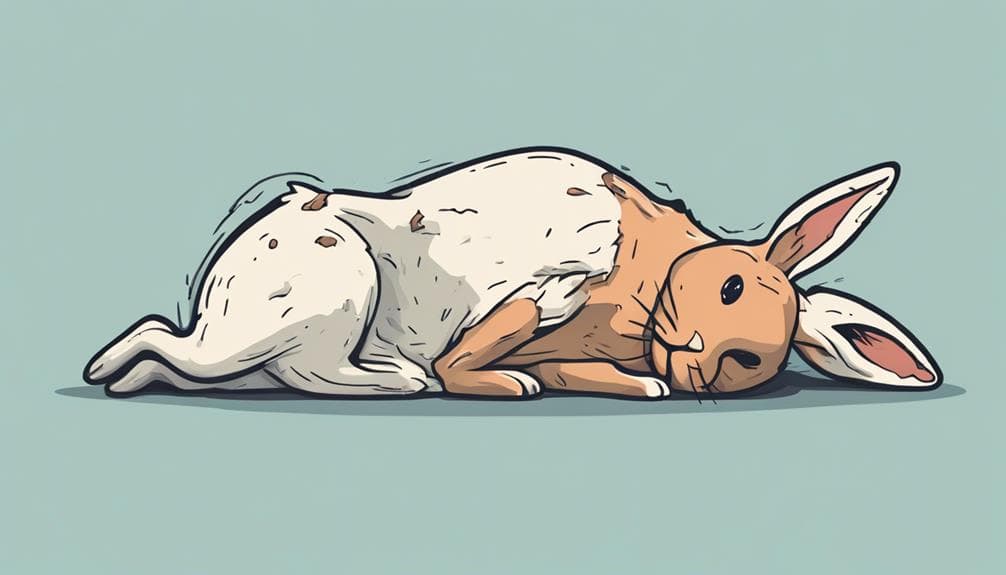
In cases of bunny colic emergency care, immediate veterinary attention is essential to prevent life-threatening complications. Bunny colic, or gastrointestinal stasis, can manifest through symptoms like decreased appetite, lethargy, reduced fecal output, teeth grinding, and abnormal gut sounds.
When faced with such signs, prompt action is important. Veterinary intervention may involve fluid therapy to address dehydration, pain management to alleviate discomfort, motility-modifying drugs to stimulate gut movement, and tailored supportive care.
Timely intervention plays a critical role in the treatment of bunny colic, improving the chances of recovery and reducing the risk of further complications. Remember, recognizing the symptoms early and seeking professional help promptly are important steps in addressing bunny colic emergencies. By acting swiftly and decisively, you can provide the best possible outcome for your rabbit in such challenging situations.
Supporting a Bunny Recovering From Colic
Supporting a bunny recovering from colic involves providing proper nutrition, fluid therapy, and pain management to facilitate a speedy and effective recuperation process. Here are some essential steps to aid in the recovery of your bunny:
- Proper Nutrition: Offer fresh hay, leafy greens, and limited pellets to encourage digestion and prevent further gastrointestinal stasis issues.
- Fluid Therapy: Guarantee your bunny stays hydrated by providing fresh water and, if needed, electrolyte solutions to support recovery.
- Pain Management: Consult with your vet for appropriate pain relief medication to keep your bunny comfortable during the healing process.
- Movement Stimulation: Gently encourage your bunny to move around to help stimulate gut motility and aid in the recovery of their digestive system.
Frequently Asked Questions
What Causes Colic in Rabbits?
Dietary changes, stress factors, genetics, environmental influences, digestive issues, parasitic infections, bacterial overgrowth, and medication side effects can cause colic in rabbits. Recognizing these triggers early and seeking veterinary care promptly is important for treatment.
How Do I Know if My Rabbit Has Trapped Gas?
If your rabbit shows signs like dietary changes, stress, abdominal discomfort, or behavioral shifts, they may have trapped gas. Try gentle tummy massages, encourage movement for gas relief, and seek veterinary care if symptoms persist.
How Do I Know if My Bunny Has a Blockage?
To assess if your bunny has a blockage, monitor dietary changes, poop consistency, signs of lethargy, perform belly massages, observe urine output, eating habits, weight loss, and promptly seek a veterinary visit for proper diagnosis and treatment.
How Do I Know if My Rabbit Has GI Stasis?
To recognize if your rabbit has GI stasis, observe changes in appetite, fecal output, energy levels, posture, teeth grinding, and gut sounds. Prioritize veterinary care for prompt diagnosis and treatment. Quick action boosts recovery chances.
Can Colic in Bunnies Lead to Explosive Symptoms?
Yes, colic in bunnies can lead to explosive symptoms. When bunnies experience colic, they can suffer from bloating and gas build-up in their digestive system, which can result in explosive symptoms such as sudden, severe discomfort and even rupture if not treated promptly. Understanding the signs of colic in bunnies can make a significant difference in their well-being. Always monitor their health carefully to prevent any instances where can bunnies explode.
Conclusion
To summarize, when it comes to bunnies and colic, swift action is key to saving their lives. Remember, bunny colic is no joke – it's a serious condition that requires immediate attention.
Stay vigilant, know the signs, and don't hesitate to seek veterinary help at the first sight of trouble. Your quick response could mean the difference between life and death for your beloved bunny.
Stay informed, stay prepared, and keep those bunnies happy and healthy.

